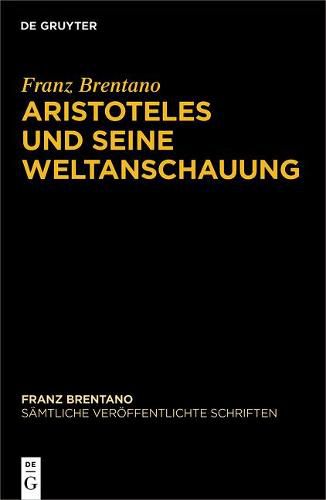Readings Newsletter
Become a Readings Member to make your shopping experience even easier.
Sign in or sign up for free!
You’re not far away from qualifying for FREE standard shipping within Australia
You’ve qualified for FREE standard shipping within Australia
The cart is loading…






This title is printed to order. This book may have been self-published. If so, we cannot guarantee the quality of the content. In the main most books will have gone through the editing process however some may not. We therefore suggest that you be aware of this before ordering this book. If in doubt check either the author or publisher’s details as we are unable to accept any returns unless they are faulty. Please contact us if you have any questions.
Aristoteles und seine Weltanschauung ist Franz Brentanos letztes Wort in seiner lebenslanglichen Auseinandersetzung mit seinem ersten und groessten philosophischen Lehrer. Indem er sich auf die aristotelische Metaphysik und hier vor allem auf die Gotteslehre konzentriert, versucht er einerseits zu zeigen, dass die oft als dunkel und widerspruchlich hingestellten Lehren des Aristoteles sich konsistent rekonstruieren lassen, und dass Aristoteles andererseits als ein Vertreter des metaphysischen Optimismus, als ein antiker Leibniz also, betrachtet werden kann.
$9.00 standard shipping within Australia
FREE standard shipping within Australia for orders over $100.00
Express & International shipping calculated at checkout
This title is printed to order. This book may have been self-published. If so, we cannot guarantee the quality of the content. In the main most books will have gone through the editing process however some may not. We therefore suggest that you be aware of this before ordering this book. If in doubt check either the author or publisher’s details as we are unable to accept any returns unless they are faulty. Please contact us if you have any questions.
Aristoteles und seine Weltanschauung ist Franz Brentanos letztes Wort in seiner lebenslanglichen Auseinandersetzung mit seinem ersten und groessten philosophischen Lehrer. Indem er sich auf die aristotelische Metaphysik und hier vor allem auf die Gotteslehre konzentriert, versucht er einerseits zu zeigen, dass die oft als dunkel und widerspruchlich hingestellten Lehren des Aristoteles sich konsistent rekonstruieren lassen, und dass Aristoteles andererseits als ein Vertreter des metaphysischen Optimismus, als ein antiker Leibniz also, betrachtet werden kann.